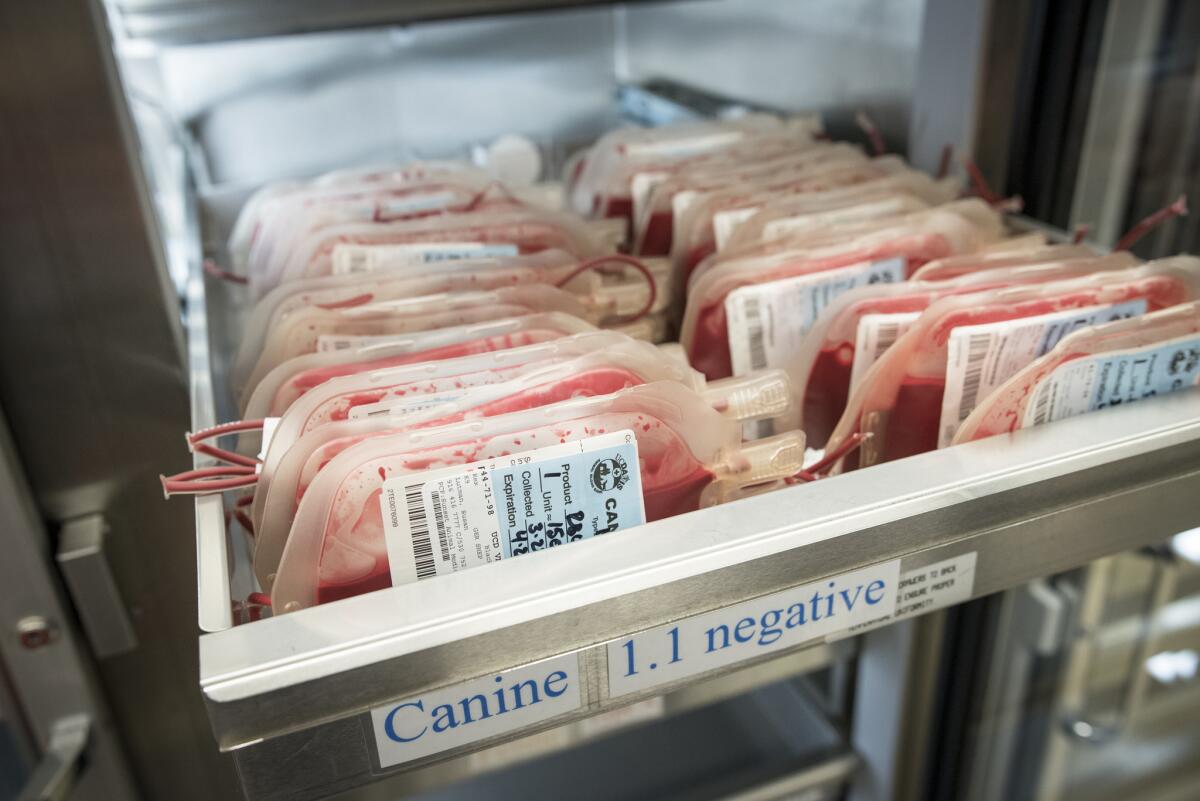Newsom blocks overhaul of California’s dog blood donor rules, saying it doesn’t go far enough

- Share via
SACRAMENTO — Gov. Gavin Newsom vetoed a bill Sunday that would have brought new oversight of California’s dog blood industry that supplies veterinary hospitals with lifesaving products for pets in the state, saying the proposal approved by lawmakers “does not go far enough.”
Instead, Newsom said he wants legislators to send him a bill that would phase out the use of “closed colonies,” in which dogs are “kept in cages for months and years to harvest their blood for sale.”
“The legislation should provide for the safe and humane treatment of donor animals, the welfare of the recipients and adequate oversight and enforcement of this program,” the governor wrote in his veto message.
Under Senate Bill 202 by state Sen. Scott Wilk (R-Santa Clarita), California would have joined the rest of the country in allowing dog owners to volunteer their pets to donate blood while continuing to allow closed colonies to operate. With the veto, the state will continue to require that veterinarians purchase blood products solely from companies that house donor animals for the purpose of drawing their blood every 10 to 14 days.
SB 202 also would have rolled back sweeping public records exemptions that have allowed private animal blood companies in the state to operate colonies of caged donor dogs under a cloak of secrecy. SB 202 would have made public annual inspection reports by the California Department of Food and Agriculture, information that has been shielded from disclosure since the state first began examining the facilities in 2002.
Wilk said the state must allow for additional sources of dog blood amid a national shortage and that the bill would have made “a real difference” for pets in need. The need for dog blood has been rising across the country as more pet owners opt to treat injuries and diseases that require blood transfusions.
Some animal welfare groups were unhappy with SB 202 and instead wanted legislation allowing voluntary pet donations while phasing out the use of dogs housed as blood suppliers, but a bill to do so died amid opposition from the California Veterinary Medical Assn. The veterinary group argued that eliminating the use of company-owned donor dogs could create a massive blood shortage that would put the injured and sick animals they care for at risk.
Newsom’s veto message made clear he believes the animal blood donor system should change and that housing dogs for the purpose of drawing their blood is not the answer. Instead of making an incremental change, he asked for a new bill.
“Until you have a dog who is a family member in crisis, you don’t understand how ridiculous the system is in California,” said Kassy Perry, a longtime communications professional in the state Capitol who began advocating for SB 202 last week after her daughter’s dog nearly died when the veterinarian could not get the necessary blood products for him. “Why would you not allow for voluntary donations now and go after closed colonies next if you chose?”
The operators of the two animal blood banks in California — Hemopet and Animal Blood Bank Resources International — say housing colonies of donor dogs ensures a regular supply of safe blood for veterinarians. Greyhounds make up the bulk of blood donors at the facilities because of their generally docile temperament and their “universal” blood type, which can be used to treat any breed.
The owner of Hemopet said her Garden Grove facility has more than 200 greyhounds that were former racing dogs in other states. Animal Blood Bank Resources International, based in Dixon, does not disclose where its donor dogs are kept or how many animals it has. That information would be available on the state’s inspection reports that would be made public under SB 202.
More to Read
Sign up for Essential California
The most important California stories and recommendations in your inbox every morning.
You may occasionally receive promotional content from the Los Angeles Times.














